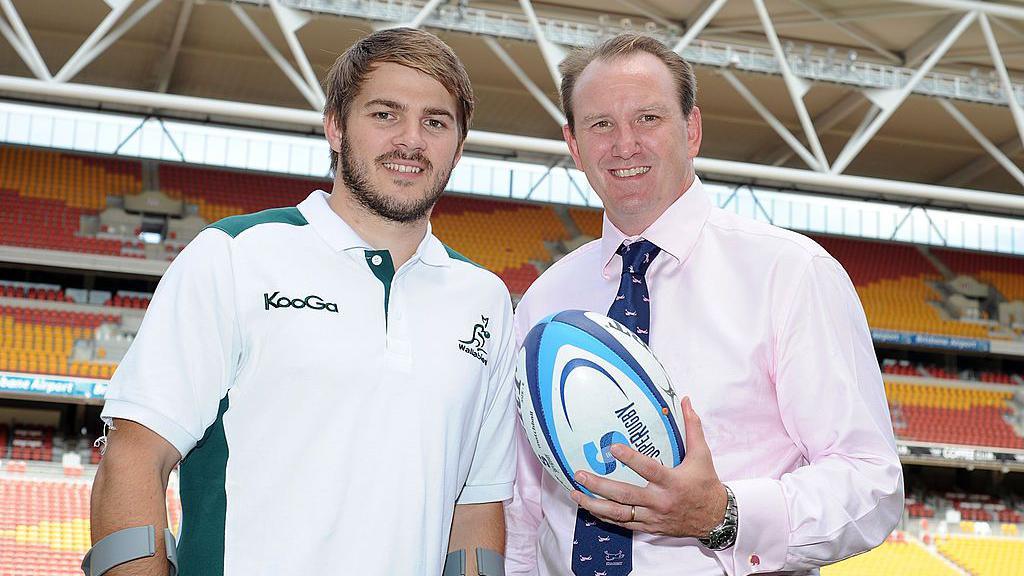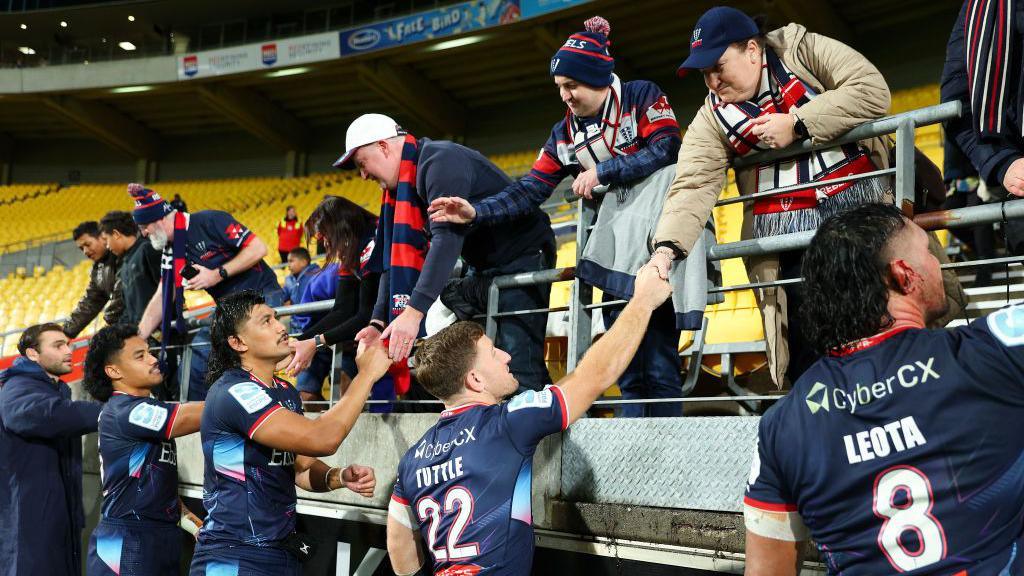Test rugby must get on the road – World Rugby candidate Robinson

Robinson, right, has previously worked as the high-performance manager and deputy chair of Rugby Australia
- Published
Rugby’s superpowers must play more matches in new regions for the good of the game overall, says prospective World Rugby chair Brett Robinson.
The 54-year-old Australian is one of three candidates standing for the top job at the game's global governing body, alongside fellow former Test players Abdelatif Benazzi of France and Andrea Rinaldo of Italy.
The chair will be elected by World Rugby’s 52-member council on Thursday in Dublin.
"It is not a new thing to be taking major matches to new countries or other venues to generate interest and revenue," he told BBC Sport.
"If we don't get on with it, we will miss the opportunity. So I would push us to get moving.
"In most of our core markets, particularly in the northern hemisphere, the growth opportunities are not as significant for the game as they are potentially in other parts of the world."
Japan 2019 was the first time the Rugby World Cup was held outside one of the game’s heartlands, while the 2031 event will be hosted by the United States.
Qatar has been slated as a future venue for the finals of the new biennial Rugby Nations Championships, which will bring the best teams from both hemispheres together for a season climax for the first time in 2026.
One-off Tests, such as New Zealand's meeting with Fiji in San Diego in July, have been held away from union strongholds.
Robinson believes that other major unions need to do more to spread the game, particularly in preparation for a stateside World Cup.
"The lead-in to that tournament is really important," he added. "We need alignment with our major unions about what we might take to the United States and where we might go to have the cut-through and connections with fans."

Robinson won 16 caps for the Wallabies as a flanker
Robinson also wants rugby to experiment more with how the sport is played and presented to lock in a young generation of fans.
"The channels that we historically consumed through - print, TV and radio - are not the channels younger people consume," he said.
"When you look at the way that NBA and NFL are targeting my kids and their friends with the gaming, with the Netflix series, the podcasts- we have to challenge ourselves to do things that are contemporary and relevant to them."
This year’s Autumn Nations Series has included several new law variations – including 20-minute red cards and speeding up the set-piece – along with referees broadcasting the reasoning behind their decision to the stadium crowds.
Robinson believes there is still more to be done to keep the action flowing and to reward teams attacking with ball in hand, rather than kicking.
"The fan is not something we have necessarily put in the centre, and I do think that is changing," he added.
"At World Rugby, we have historical process about change and that is challenging because we are a massive global sport with lots of stakeholders, but we can probably do more.
"I think we can probably reflect on how we move things forward faster - it is probably the impatient Australian in me but I find it a bit bureaucratic."
One area where Robinson does want more regulation is around player contracts and movement.
He is concerned about the international transfer of young prospects, with academies offering teenage players in the men's game contracts to move thousands of miles from home and potentially out of contention for their native international side.
Another issue is the pressure that rising player wages have placed on the club game. Australian side Melbourne Rebels followed English Premiership sides Wasps, London Irish and Worcester into administration earlier this year.
"World Rugby doesn’t directly control things, but it has a role in bringing together unions to consider how we can deal with it," said Robinson.
"We need to work together on a model that creates some friction in player transfer arrangements, because we have some environments where player wage inflation is being underwritten by philanthropy, not the true commercial revenues of the sport.
"That is not sustainable in that competition, but also it is destroying the foundations of other competitions as talent leaves or the attempt to retain it pushes the salary budget through the roof and teams fall over."

Melbourne Rebels players bid farewell to fans after their final Super Rugby match in June
Related topics
- Published27 September 2024
